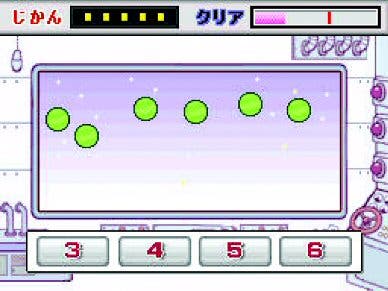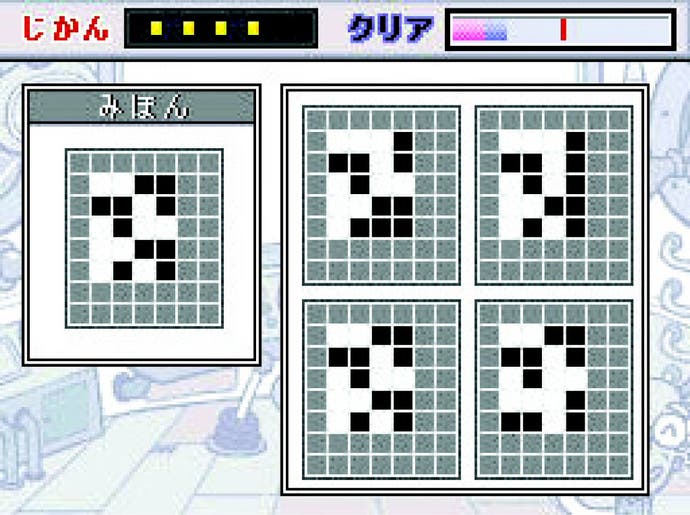The Professor's Brain Trainer - Logic
A logical cash-in, you might say.
And so it begins.
Mere months after the runaway success of Nintendo's masterful Brain Training (and the less successful Big Brain Academy), the bandwagon jumpers are already in evidence. Is that a bad thing? Yes in shameless, cynical, dead-eyed cash-in sense (look at the name - they're not even hiding that it's a cash-in), but not if they end up making up for the shortfalls of Nintendo's attempts.
For as moreish and near-perfect as Brain Training was in conception and execution, there just wasn't that much to it. Too few challenges lead to endless repetition, and unless you had someone competing with you on the same machine over a period of weeks and months, it was all over in no time. Still, it had oceanic potential to be one of the all-time must-have handheld games, and still does.
Which is, hopefully, where this logic-based Brain Trainer comes in. Released, cheekily, in two versions (the other being Memory-based), we got to grips with the Logic version - which is just as well, as our short-term memory is all screwed to hell. What day is it again?
Ignoring the entirely superfluous storyline, the game's purpose is to try and stimulate the right half of the brain "where most of the dormant abilities lie". Apparently, a clever chap called Makoto Shichida established that daily drills of viewing shapes and colours and "absorbing large amounts of information in fast rhythms" helped stimulate the right brain. His work has become so well acknowledged, that over 400 schools in Japan have adopted his methods - so, presumably, the 'drills' contained within this here game aren't just knocked up in someone's shed. So there.
But as impressive as all that sounds, the drills couldn't really be any more basic. You either plump for a series of level-based challenges, or practice one of six disciplines over four different difficulty settings, with each of the four difficulties available for you to try out. Each challenge has twenty problems to solve, and each gives you five seconds to figure them out before you move on to the next.

Finding Friends, for example, is typical of the basic type of challenge you'll face. Set on a four by five square grid, you have five seconds in which to touch the two illustrations that match, and so on until you run through all twenty. To start with, you'll have few other illustrations to distract you, but, sure enough, it soon become quite tricky to pick out the matching shape quickly.
Likewise, Shape Recognition seems simple enough to begin with - all you have to do is pick out the matching shape among four choices on the touch-screen. But, again, once the differences start becoming marginal, the five seconds you're given flashes by.
Addition, meanwhile, places a bunch of numbered tiles on the screen and tasks you with, durr, adding them up. But unlike Nintendo's efforts, it's doesn't require written input, and instead places a choice of four possible answers - meaning you can guess your way through if it all gets a bit hectic. Which, inevitably, it does as soon as you get off the early levels.
The Remembering Sequence played complete havoc with my ailing brain - not because it was especially taxing, but, well, because I'm clearly having some sort hitherto unknown short-term brain failure issue. The premise is to simply watch a short sequence of illustrations appear on a four by three grid and touch the one that, for example, appears second in that sequence. Sadly, I wasn't exactly stellar at this task. So we'll move on swiftly.
Moving Dots, though, was a piece of cake. Again, multiple choice, the idea is to report how many moving dots you can see on the screen within the five second limit. The early levels were insultingly easy, and once you get a feel for it, even the hardest level isn't the biggest challenge your brain will ever face.

And that, amazingly, is it.
Challenge mode is, well, pretty challenging on the higher levels, but at no stage particularly compelling, addictive or especially well presented or constructed. Once you've cleared each game on each difficulty, it unlocks the next rank of difficulty, and the process continues until you get bored - which is alarmingly quickly. There's no sense of having all sorts of hidden extras to unlock, no real incentive to come back and better your scores, and no daily practice regime to prepare you for the big test - in short, it's even more anorexic in terms of what it offers than Brain Training, and without any of the cool stuff like voice recognition, the silly graphs, the quips and the like. At least Brain Training had Sudoku to keep you going if all else failed.
If anything, with its insultingly generic WarioWare-inspired visual approach, it feels more like a stripped-down Big Brain Academy - except with far fewer challenges and none of the goofy charm and they've not even bothered to quantify the improvements in your brain power in any meaningful way. You get a percentage score for your performance on any given task, and a score - that's it. As for multiplayer modes, forget it. There's nothing to see here.
505 Game Street has been commercially smart to jump aboard the Brain Training bandwagon quickly, but it has made a huge mistake in throwing a faceless copycat effort out there. Hopefully people will not be remotely fooled - we're certainly not.

